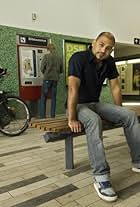Advanced search
- TITLES
- NAMES
- COLLABORATIONS
Search filters
Enter full date
to
or just enter yyyy, or yyyy-mm below
to
to
to
Exclude
Only includes titles with the selected topics
to
In minutes
to
1-7 of 7
- Football is God explores the close relation between faith and football, following three fans of the legendary Club Atlético Boca Juniors - Boca for short - in Buenos Aires, Argentina. Hernán is an intellectual intoxicated by a love for Boca he cannot shake off. He finds himself torn between reason and his passion for Boca. A struggle that threatens to destroy him. Pablo is a working class man that believes that the former Boca player Diego Maradona is a God. Pablo bears a burning desire to meet his God. La Tía (The Auntie) is an old eccentric. She considers the Boca players her sons. The film follows La Tía in her pursuit of delivering a birthday present to her favourite player, Martín Palermo. The birthday present is a pair of boxer shorts. And she would like to see him try them on. Football is God is a film about football - and a film about so much more than that. It is a film about faith, passion and the need for being part of something bigger than one self.
- Half of the human population lives in urban areas. By 2050, this will increase to 80%. Life in a megacity is both enchanting and problematic. Today we face peak oil, climate change, loneliness and severe health issues due to our way of life. But why? The Danish architect and professor Jan Gehl has studied human behavior in cities through four decades. He has documented how modern cities repel human interaction, and argues that we can build cities in a way, which takes human needs for inclusion and intimacy into account. 'The Human Scale' meets thinkers, architects and urban planners across the globe. It questions our assumptions about modernity, exploring what happens when we put people into the centre of our planning.
- We think, we talk, we write. Without language, we wouldn't be human. Out of the 6500 languages in the world, half of them will disappear. 'Voices of the world' discusses the multiplicity of the world's languages. There is the language of violence, the dying language, the minorities' language, the youth's language and new languages. How will globalization affect them all?
- Nikolai Lang and his one man think tank Danish Center for Integration Analysis (DCIA) has decided to end the Danish debate about integration once and for all. His goal is to find the Danish ideal for the Perfect Danish Muslim. He then wants to introduce all Danish Muslims to this ideal. Nikolai Lang takes a scientific approach in order to understand the Danes. He wants to avoid the usual media and policy spin. He uses focus groups and telephone interviews. He questions experts in Danish culture - and presents his results for a group of young second generation immigrants in Gellerup Parken in Århus. Are they ready to follow his 10 rules for perfect integration? The director, Fenar Ahmad, whose family came to Denmark from Iraq, follows Nikolai Lang's investigation and at the same time he investigates his own personal encounter with Denmark.
- 10 short documentaries which form a presentation of Denmark as part of a dialogue project in the wake of the Muhammed drawings. 10 reputable Danish filmmakers are invited to create 10 presentations of Denmark, in collaboration with second-generation immigrants with roots in the Middle East. Each film is shaped as this person's personal application to a relative or acquaintance in the Middle East. The assignment is: Give an important statement about your Denmark, with the intention of challenging and differentiating the image your relative or acquaintance has of Denmark. The strength of the films is in insight and reflection, rather than the dramatic news approach and is communicated through the personal approach to the subject. The 10 films are joined together into one film (duration 58:30 mins), and this film will be a quick and intense contribution to the debate following the publication of the Muhammed drawings. The film was broadcast on national Danish television as well as a Middle Eastern television station in June 2006.
- Heine came home from war, but he is still struggling for his life every day.
- There are only 320 Mlabri people left on this planet. They used to live as hunters and gatherers in Northern Thailand. Now the jungle has gone and over the last generation the Mlabri have begun to settle. They scrape out a meagre existence working as day-labourers. This is a decisive moment in Mlabri history. The first children are getting ready to leave their parents to go to boarding school in town. The parents fear that the ground will split. What will happen to Mlabri language and culture? Will the children come back? Will the start to marry outsiders? Right now everyone in the Mlabri community face the crucial questions: How does one adapt to a world full of Outsiders? How does one integrate without disappearing? A film about the Mlabri, told by themselves, in their own language.






